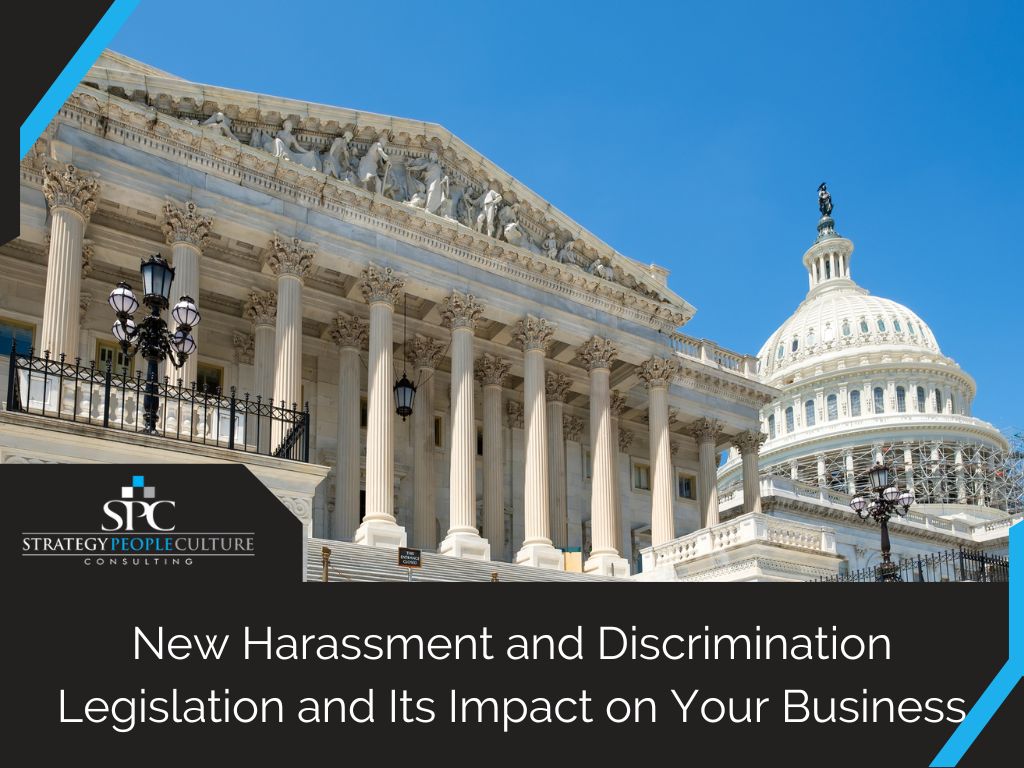New Harassment and Discrimination Legislation and Its Impact on Your Business

In our recent blog post, “The Impact of Harassment and Discrimination in Corporate America’s Policies,” we presented various Federal laws defining and governing these behaviors. We also explained their costs, not just financial, but also in reputation to customers, current staff, and potential hires. Here, we continue the discussion with recent and new activities related to harassment and discrimination in the United States Congress and their potential impact on our society. Their importance cannot be overstated enough to a business’s reputation and financial success.
New Anti-Harassment and Discrimination Bills in the House
On August 1st, 2022, a group of legislators introduced two bills to United States Congress. The first is the No Tax Deductions for Workplace Harasser Buyouts Act. This bill eliminates tax deductions for separation packages paid to employees involved in alleged workplace harassment or discrimination. This bill adds to the provisions included in the Tax Cuts and Jobs Act of 2017, limiting tax cuts on corporate legal fees to defend against harassment suits and arbitration. Specifically, the Act adds a provision to Section 162 of the IRS code of 1986 stating, “no deduction shall be allowed for any settlement or payment related to Sexual Harassment or Sexual Abuse if such settlement or payment is subject to a non-disclosure agreement; or attorneys’ fees related to such a settlement or payment.”

The second has far-reaching implications for more organizations. It emphasizes the importance of implementing practices that prevent harassment and discrimination from taking root in corporate culture in the first place. The Ending Secrecy About Workplace Harassment Act would require companies to submit an annual report that specifies the total number of settlements with employees involving workplace harassment. Furthermore, it requires that this report provide the number of such settlements by protected category, such as race, color, national origin, religion, sex, age, disability, genetic information, or any combination of such factors.
Transparency

The message of the proposed and existing legislation is fairly straightforward. Businesses need to be transparent about their harassment and discrimination issues. Attempts to amicably part ways with offending staff or silence alleged victims will no longer provide a tax shelter, creating a further negative effect on the bottom line. If the proposed second bill passes the legislature and is signed by President Biden, this would become law. Corporations would find themselves under even further public scrutiny and potentially expose patterns of discriminatory behavior. Neither are favorable to a business’ sustainability.
Having a culture free of harassment and discrimination has always been a good idea for many reasons, including building and maintaining a peaceful work environment. That said, the continuation of legislative attempts, both on the Federal and State level, respectively, underscores its growing importance for many other business reasons as well.
Fostering a Culture of Inclusivity

Fostering a culture of inclusivity in the workplace may be part of an effective strategy to avoid the costs and reputation damage associated with legal action, negative will with employees, etc. Of course, this is easier said than done. The United States was built by a “melting pot” of people from various backgrounds, cultures, and upbringings, making it fairly obvious why there is such a broad spectrum of beliefs. Workplaces are simply a microcosm of American history. Several things need to happen for people to align with sound, inclusive workplace values.
1) Your Employees Must Know the Rules
That is, organization policies should prohibit sexual harassment and all forms of discrimination. What behaviors will not be tolerated? What is the employee’s role not just as a potential offender but as a bystander? How can a potential victim or witness report claims? How will such reports be treated? Will the alleged victim and witnesses have protections against retaliation?
This should be outlined not only with a clear written policy but also be part of new employee and ongoing employee training. Repeating this periodically helps to foster an environment where all employees know the policy is taken seriously.
2) Your Employees Must Understand the Rules
Having policies simply isn’t enough. A list of rules is great, but unless employees understand what the policies mean. Why are certain behaviors considered offensive to certain individuals or groups of people from varying cultures, backgrounds, genders, and beyond? What do local and federal laws dictate? What do studies conclude is the nature of a safe work environment and its impact on the success of a business? These are all important questions to answer for your employees as part of a sound training program. This is not only an excellent way to help employees understand your policies, but also has important grounded legal reasons seen through U.S. Supreme Court case law. This understanding helps move the idea of a safe work environment from policy to culture.
3) Your Employees Need to Be Held Accountable if They Do Not Uphold the Rules
Your company’s anti-discrimination and anti-harassment policy is not the only thing that needs to be clear. Your employees need to clearly understand how alleged incidents will be handled and the real potential for consequences that may befall the violator should they be found to be in non-compliance after an investigation.
4) Leadership Must Set the Example
Leadership integrity is key. A leader needs to walk the talk. If the rules only apply to subordinate employees but not leadership, employees may struggle to internalize them. Leadership fosters the corporate culture. If the corporate culture is to be a safe and inclusive one, leaders must set an example of anti-discrimination and anti-harassment behavior.
Letting Your Inclusive Culture Be Known

Even companies with the most inclusive cultures can encounter issues related to sexual harassment and discrimination. As the article “The Impact of Harassment and Discrimination in Corporate America’s Policies” explains, the best way to mitigate damage to a business is to be proactive. Being proactive and performing timely investigations is critical. Doing this not only helps in the defense against potential lawsuits but also shows employees that the organization takes these matters seriously. Being fair to both the alleged victim and the alleged accused is of utmost importance. That is, a thorough and impartial investigation is the way to go. Not only is it reasonable, but it lends credibility to your anti-discrimination and anti-harassment policy and to your commitment to an inclusive culture.
Establishing an Inclusive, Anti-Discrimination, Anti-Harassment Culture

It takes some concerted effort to foster an inclusive culture. The costs of ignoring the concept are simply too high – high enough to outweigh the costs of a solid training program and top-down adoption of good policy.
A sound, thorough anti-discrimination and anti-harassment program starts with a solid foundation of knowledge. For that reason, it makes sense to solicit the advice of experts who handle this subject regularly.
At Strategy People Culture, we specialize in building a better corporate team culture. We offer Federal and State-compliant employee anti-discrimination training, as well as leadership and executive coaching specifically designed to identify and address any weaknesses and build upon strengths to meet corporate goals.
We can help your team with the following:
- Proactive, preventative education and training on sexual harassment and discrimination in the workplace
- Corrective action training on sexual harassment and discrimination in the workplace
- Neutral workplace investigations on matters related to sexual harassment or discrimination.
- Strategies for employee and management training
- Executive development on effective leadership
- Training that includes role-play with or analysis of hypothetical situations involving sexual harassment, racism, etc.
This is our area of expertise. If you’re looking for more information on anti-discrimination and anti-harassment services or leadership development help, reach out to the Strategy People Culture team today. We’re happy to help your company and its leaders build a better, more inclusive company culture.
Send us a message online or call 833-ROCK-SPC.
